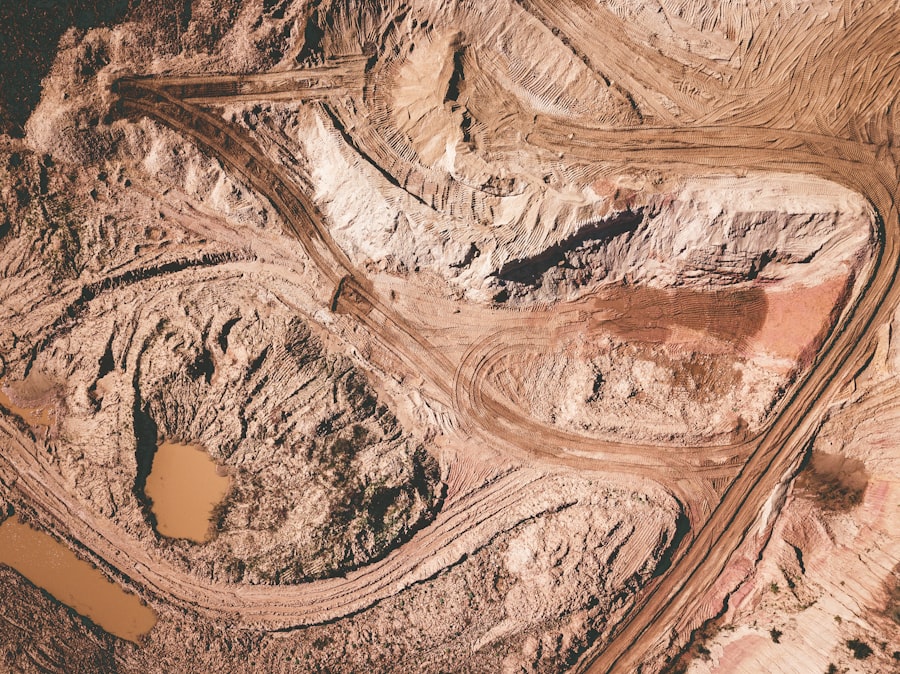The Ndassima Gold Mine, located in the Central African Republic (CAR), has emerged as a focal point of interest due to its rich mineral deposits and the complex socio-political dynamics surrounding its operations. This mine, which has been in operation since the early 2000s, is situated in a region that has long been plagued by instability and conflict. The gold extracted from Ndassima is not only a significant contributor to the local economy but also plays a crucial role in the broader context of the CAR’s economic landscape.
As one of the few functioning mines in a country that has faced numerous challenges, Ndassima represents both opportunity and risk. The mine’s strategic importance is underscored by its potential to generate revenue for the CAR government, which has struggled to maintain control over its resources amid ongoing civil strife. However, the involvement of various external actors, particularly private military companies, has complicated the situation.
The Ndassima Gold Mine serves as a microcosm of the broader issues facing the CAR, including governance, resource management, and the impact of foreign intervention in local affairs. Understanding the dynamics at play in Ndassima is essential for grasping the complexities of resource extraction in conflict zones.
Key Takeaways
- Wagner Group has taken control of the Ndassima Gold Mine, significantly influencing its operations and local dynamics.
- Their presence has led to notable environmental degradation and raised serious human rights concerns.
- The local community has experienced both economic changes and increased conflict due to Wagner’s activities.
- International actors have expressed concern and imposed sanctions in response to Wagner’s involvement.
- The future of the Ndassima Gold Mine remains uncertain, with ongoing legal, regulatory, and security challenges linked to Wagner’s role.
Wagner’s involvement in the Ndassima Gold Mine
The Wagner Group, a private military company with ties to the Russian government, has become increasingly involved in the operations at the Ndassima Gold Mine. This involvement is part of a broader strategy by Russia to expand its influence in Africa, particularly in resource-rich nations like the CAR. Wagner’s presence at Ndassima is characterized by a dual role: providing security for mining operations while also engaging in direct extraction activities.
This multifaceted approach has raised questions about the legality and ethics of their operations. Wagner’s engagement at Ndassima is not merely a business venture; it is also a strategic move that aligns with Russia’s geopolitical interests. By securing access to valuable resources like gold, Wagner enhances its operational capabilities while simultaneously bolstering the CAR government’s authority.
This relationship has led to a complex interplay between military power and economic gain, where Wagner’s security services are often seen as essential for maintaining stability in an otherwise volatile environment. The implications of this involvement extend beyond mere profit; they touch upon issues of sovereignty, governance, and international relations.
Wagner’s impact on the local community

The presence of Wagner at the Ndassima Gold Mine has had profound effects on the local community, both positive and negative. On one hand, Wagner’s security measures have provided a semblance of stability in an area that has experienced significant violence and unrest.
The influx of resources and investment associated with Wagner’s operations has also created job opportunities for locals, contributing to a degree of economic upliftment. However, this perceived stability comes at a cost. The local community has expressed concerns about the heavy-handed tactics employed by Wagner personnel, who are often seen as enforcing order through intimidation and violence.
Reports of human rights abuses have surfaced, painting a troubling picture of life under Wagner’s influence. The duality of their impact—providing security while simultaneously instilling fear—has left many residents grappling with conflicting feelings about their presence. As such, Wagner’s role in Ndassima is emblematic of the broader challenges faced by communities caught between the need for security and the desire for human rights and dignity.
Environmental impact of Wagner’s operations
| Metric | Value | Unit | Notes |
|---|---|---|---|
| Carbon Emissions | Approx. 150,000 | Metric Tons CO2/year | Estimated from military vehicle and equipment usage |
| Land Degradation | 500 | Hectares | Area affected by military operations and training exercises |
| Water Contamination Incidents | 12 | Reported cases (last 5 years) | Linked to fuel spills and chemical runoff |
| Deforestation | 200 | Hectares | Cleared for operational bases and logistics |
| Noise Pollution Level | 85-110 | dB | Range near active operational zones |
The environmental implications of Wagner’s operations at the Ndassima Gold Mine are significant and warrant careful consideration. Mining activities inherently disrupt local ecosystems, leading to deforestation, soil degradation, and water pollution. In a region already vulnerable to environmental degradation due to conflict and poor governance, Wagner’s extraction practices have raised alarms among environmentalists and local activists alike.
The use of heavy machinery and chemicals in gold processing can contaminate water sources, posing risks not only to wildlife but also to human health. Moreover, the lack of regulatory oversight exacerbates these environmental concerns. With Wagner operating in a context where governance structures are weak or non-existent, there is little accountability for environmental damage caused by mining activities.
This situation highlights a critical gap in environmental protection measures within the CAR, where economic interests often take precedence over ecological sustainability. As communities rely on natural resources for their livelihoods, the long-term consequences of environmental degradation could undermine any short-term economic benefits derived from mining.
Human rights concerns at Ndassima Gold Mine
Human rights issues surrounding the Ndassima Gold Mine have come to the forefront as reports of abuses linked to Wagner’s operations continue to emerge. Allegations include forced labor, arbitrary detentions, and violence against local populations who resist or challenge Wagner’s authority. These violations raise serious ethical questions about the conduct of private military companies operating in conflict zones and their accountability to international human rights standards.
The situation is further complicated by the lack of transparency surrounding Wagner’s operations. With limited oversight from both local authorities and international bodies, there is little recourse for affected individuals seeking justice or redress for grievances. The intertwining of military power with economic interests creates an environment where human rights are often sidelined in favor of profit and control.
As such, the plight of local communities living near Ndassima serves as a stark reminder of the urgent need for robust mechanisms to protect human rights in resource-rich regions.
Conflict and violence associated with Wagner’s presence

Wagner’s involvement at the Ndassima Gold Mine has not only altered the economic landscape but has also intensified existing conflicts within the region. The group’s military presence has led to an escalation of violence as they engage with rival factions vying for control over lucrative mining areas. This dynamic has created an atmosphere of fear and uncertainty among local populations, who find themselves caught in the crossfire between competing interests.
The violence associated with Wagner’s operations extends beyond direct confrontations; it also manifests in retaliatory actions against communities perceived as threats to their authority. Reports indicate that civilians have been subjected to violence as a means of enforcing compliance or punishing dissent. This cycle of violence perpetuates instability in an already fragile region, undermining efforts toward peace and reconciliation.
The consequences are dire for local communities that bear the brunt of this conflict, often losing their homes, livelihoods, and sense of security.
International response to Wagner’s involvement in the Ndassima Gold Mine
The international community has taken note of Wagner’s activities at the Ndassima Gold Mine, prompting discussions about potential responses to their involvement. Various human rights organizations have called for investigations into alleged abuses linked to Wagner’s operations, urging governments and international bodies to hold accountable those responsible for violations. However, responses have been mixed, with some countries expressing concern while others remain silent or even supportive of Wagner’s presence.
Sanctions have been proposed as a means to deter further abuses and limit Wagner’s influence in the CAR; however, implementing effective measures poses significant challenges. The opaque nature of Wagner’s operations complicates efforts to track their activities and enforce accountability. Additionally, geopolitical considerations often influence how countries engage with Russia and its affiliates, leading to hesitancy in taking decisive action against Wagner.
As such, the international response remains fragmented, reflecting broader tensions in global politics.
Economic implications of Wagner’s activities at the mine
Wagner’s activities at the Ndassima Gold Mine have significant economic implications for both the local community and the Central African Republic as a whole. On one hand, their involvement has led to increased investment in mining infrastructure and job creation for local residents. The influx of resources associated with gold extraction can provide much-needed revenue for a country struggling with poverty and underdevelopment.
However, this economic boost comes with caveats. Much of the wealth generated from mining may not benefit local communities directly; instead, it often flows into the hands of foreign entities or corrupt officials who exploit these resources for personal gain. Furthermore, the volatility associated with armed groups like Wagner can deter legitimate investment from other sources, stifling long-term economic growth prospects for the region.
The challenge lies in ensuring that any economic benefits derived from mining are equitably distributed and contribute to sustainable development rather than exacerbating existing inequalities.
Legal and regulatory issues surrounding Wagner’s operations
The legal framework governing mining operations in the Central African Republic is fraught with challenges that complicate oversight of entities like Wagner. The lack of clear regulations regarding private military companies operating within resource extraction sectors raises questions about accountability and legality. In many cases, these companies operate in a legal gray area where existing laws are either insufficient or poorly enforced.
Wagner’s presence at Ndassima highlights these regulatory gaps, as their activities often occur without proper licenses or adherence to established mining protocols. This lack of oversight not only undermines efforts to promote responsible mining practices but also poses risks to human rights and environmental sustainability. Addressing these legal challenges requires concerted efforts from both national authorities and international organizations to establish robust frameworks that govern resource extraction while safeguarding human rights.
Future prospects for the Ndassima Gold Mine and Wagner’s role
Looking ahead, the future prospects for the Ndassima Gold Mine remain uncertain amid ongoing political instability and external pressures. While Wagner’s involvement may provide short-term stability and investment opportunities, it also raises concerns about long-term sustainability and governance issues. The potential for continued conflict over control of resources could hinder efforts toward peacebuilding and development in the region.
Moreover, as international scrutiny increases regarding human rights abuses linked to Wagner’s operations, there may be pressure on both local authorities and foreign investors to reassess their relationships with this private military company. The future trajectory of Ndassima will depend on how effectively stakeholders can navigate these complexities while prioritizing community needs and sustainable practices over short-term gains.
Evaluating the overall impact of Wagner’s involvement in the Ndassima Gold Mine
In evaluating Wagner’s involvement at the Ndassima Gold Mine, it becomes clear that their presence embodies both opportunities and challenges for local communities and the Central African Republic as a whole. While they may provide security and economic benefits in an otherwise unstable environment, these advantages are overshadowed by serious concerns regarding human rights abuses, environmental degradation, and escalating violence. The situation at Ndassima serves as a cautionary tale about the complexities inherent in resource extraction within conflict zones—where military power intersects with economic interests in ways that can undermine governance and exacerbate existing inequalities.
Moving forward, it is imperative that stakeholders prioritize transparency, accountability, and community engagement to ensure that any benefits derived from mining contribute positively to sustainable development rather than perpetuating cycles of violence and exploitation.
The Ndassima gold mine, which has been a focal point of conflict and controversy in the Central African Republic, has drawn attention due to the involvement of the Wagner Group, a private military company. For a deeper understanding of the geopolitical implications surrounding this mine and the activities of the Wagner Group in the region, you can read more in this related article on In The War Room.
WATCH THIS! The Secret War for Africa’s Gold: How Private Armies Fund Global Conflict
FAQs
What is the Ndassima Gold Mine?
The Ndassima Gold Mine is a significant gold mining site located in the Central African Republic. It is known for its substantial gold reserves and has been a focal point for mining activities in the region.
Who currently controls the Ndassima Gold Mine?
As of recent reports, the Ndassima Gold Mine is controlled by the Wagner Group, a private military company with ties to Russia. The group has been involved in security and operational aspects of the mine.
What is the Wagner Group?
The Wagner Group is a private military contractor known for its involvement in various conflict zones around the world. It provides security services and has been linked to Russian interests in several countries, including the Central African Republic.
Why is the Ndassima Gold Mine important?
The Ndassima Gold Mine is important due to its rich gold deposits, which contribute significantly to the local economy and the Central African Republic’s mining sector. Control over the mine also has strategic and economic implications for involved parties.
How has the involvement of the Wagner Group affected the Ndassima Gold Mine?
The Wagner Group’s involvement has led to increased security and operational control over the mine. However, it has also raised concerns regarding governance, transparency, and the impact on local communities and the environment.
What are the economic impacts of the Ndassima Gold Mine on the Central African Republic?
The mine generates revenue through gold production, which can support national development. However, the distribution of profits and the management of resources have been subjects of debate, especially with foreign entities involved.
Are there any controversies associated with the Ndassima Gold Mine?
Yes, controversies include issues related to the Wagner Group’s presence, allegations of human rights abuses, lack of transparency in mining operations, and the environmental impact of gold extraction activities.
What is the future outlook for the Ndassima Gold Mine?
The future of the Ndassima Gold Mine depends on political stability, regulatory frameworks, and the management of foreign involvement. Efforts to improve governance and ensure sustainable mining practices are critical for its long-term prospects.



